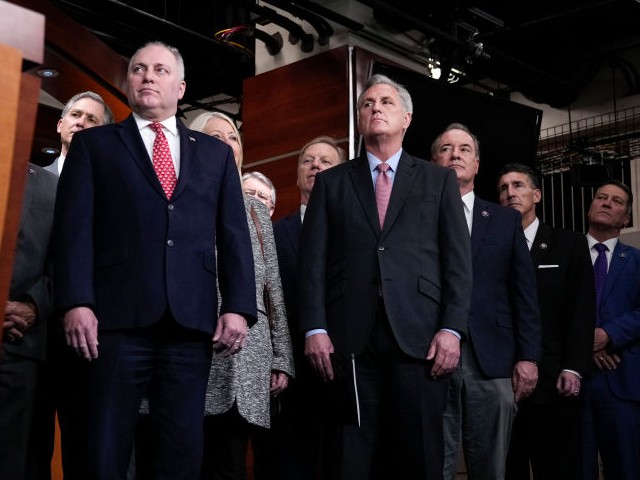Analysts from two separate groups who predict the probable outcome for U.S. House of Representatives races released their predictions on Wednesday that all move in favor of the Republican incumbent or candidate versus the Democrat.
University of Virginia Center for Politics and the Cook Political Report shifted their House predictions in favor of the Republicans.
The Center for Politics acknowledged that part of their prediction change is due to the Republicans remaining the “strong favorites to win the House majority, and with redistricting nearly complete, we can now offer a more complete assessment of what our ratings suggest for the fall.”
The analysts at the Center for Politics added that after the first quarter filing deadline last week, it is easier to see the overall playing field of the House. Their take is that incumbent House Democrats continued to raise impressive amounts of cash but so did incumbent House Republicans. Additionally, they noted that Republican challengers are either “doing fine or better than fine on the money front.”
The 11 districts the Center for Politics changed were:
- Rep. Greg Stanton (D) in Arizona’s 4th Congressional District from “Likely Democrat” to “Leans Democrat.”
- Rep. Julia Brownley (D) in California’s 26th Congressional District from “Safe Democrat” to “Likely Democrat.”
- Rep. Sanford Bishop (D) in Georgia’s 2nd Congressional District from “Likely Democrat” to “Leans Democrat.”
- Illinois’s 13rd Congressional District, an open seat currently held by a Republican, went from “Likely Democrat” to “Leans Democrat.”
- Rep. Frank Mrvan (D) in Indiana’s 1st Congressional District went from “Likely Democrat” to “Leans Democrat.”
- Rep. Bill Huizenga (R) in Michigan’s 4th Congressional District went from “Likely Republican” to “Safe Republican.”
- Rep. Richard Hudson (R) in North Carolina’s 9th Congressional District went from “Likely Republican” to “Safe Republican.”
- Rep. Susie Lee (D) in Nevada’s 3rd Congressional District went from “Leans Democrat” to “Toss-up.”
- Rep. Antonio Delgado (D) in New York’s 19th Congressional District from “Likely Democrat” to “Leans Democrat.”
- Rep. Scott Perry (R) in Pennsylvania’s 10th Congressional District went from “Likely Republican” to “Safe Republican.”
- Rep. Tony Gonzales (R) in Texas’s 23rd Congressional District went from “Likely Republican” to “Safe Republican.”
Center for Politics’s current topline rating is: 210 seats would be rated Safe, Likely, or Leans Republican, 198 would be rated Safe, Likely, or Leans Democratic, and 27 would be rated as Toss-ups.
On the other hand, Cook acknowledged that part of their prediction change is due to President Joe Biden’s average approval rating remaining at a dismal 42 percent while the country goes through soaring inflation rates and the president’s Build Back Better legislative agenda has stalled.

House Minority Whip Rep. Steve Scalise (R-LA) and House Minority Leader Kevin McCarthy (R-CA) wait to speak during a news conference with fellow House Republicans at the U.S. Capitol on January 20, 2022, in Washington, DC. (Photo by Drew Angerer/Getty Images)
“That means no Democrat in a single-digit Biden (or Trump-won) district is secure, and even some seats Biden carried by double-digit margins in 2020 could come into play this fall, giving the GOP surprising ‘reach’ opportunities,” Cook wrote.
The eight districts that Cook changed were:
- Rep. Frank Mrvan (D) in Indiana’s 1st Congressional District went from “Likely Democrat” to “Leans Democrat.”
- Rep. Susie Lee (D) in Nevada’s 3rd Congressional District went from “Leans Democrat” to “Toss-up.”
- Rep. Steven Horsford (D) in Nevada’s 4th Congressional District went from “Leans Democrat” to “Toss-up.”
- Rep. Andy Kim (D) in New Jersey’s 3rd Congressional District went from “Solid Democrat” to “Likely Democrat.”
- New York’s 4th Congressional District, an open seat currently held by a Democrat, went from “Solid Democrat” to “Likely Democrat.”
- Rep. Antonio Delgado (D) in New York’s 19th Congressional District from “Likely Democrat” to “Leans Democrat.”
- North Carolina’s 1st Congressional District, an open seat currently held by a Democrat, went from “Likely Democrat” to “Leans Democrat.”
- Rep. Abigail Spanberger (D) in Virginia’s 7th Congressional District went from “Leans Democrat” to “Toss-up.”
Cook noted that its rating showed that 27 Democrat-held seats are a “Toss Up” or worse, with the list continuing to grow. And in contrast, there are only 12 Republican-held seats that are a “Toss Up” or worse. Cook noted that all of the changes are due to redistricting, not “atmospheric factors.”
The Republicans have the upper hand walking into the November election and only need to have a net gain of five seats to regain the House.
One of the most at-risk Democrats right now is Spanberger, who has previously warned her party that they would get “f***ing torn apart in 2022” if they did not change their current course at the time. The restricting moved her congressional district from a Biden +1 to Biden +7.
But if you factor in the Republicans riding off the wave created by newly minted Virginia Gov. Glenn Youngkin (R) — the first Republican elected statewide since 2009 — her district shows a different path. According to an analysis by the Virginia Public Access Project, Youngkin would have won her district by nearly five points.
Jacob Bliss is a reporter for Breitbart News. Write to him at jbliss@breitbart.com or follow him on Twitter @JacobMBliss.

COMMENTS
Please let us know if you're having issues with commenting.